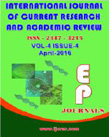Abstract Volume:4 Issue-4 Year-2016 Original Research Articles
 |
Online ISSN : 2347 - 3215 Issues : 12 per year Publisher : Excellent Publishers Email : editorijcret@gmail.com |
2Department of Electrical and Electronics Engineering, SCSVMV University, Enathur, Kanchipuram, India
A philosophical system is generally classified under three important facets, namely, epistemology, metaphysics and ethics. An attempt is made in this paper to expound the above facets of Advaita Vedanta and discern its relevance to present day students. The epistemology of Advaita Vedanta states that scriptures (or) revelation (sruti) transmitted through the verbal testimony (sabda) of the Guru is the ultimate means of measurement (pramana) regarding the source and validity of knowledge. The present day students are offered an important understanding that even though there may be innumerable sources of acquiring information, teachers are still the foremost, primary and un-substitutable source for acquiring valid knowledge. The ethical structure of Advaita Vedanta is given by the standard; Purification of the mind (sattva (or) citta suddhi). Purification of the mind points to the influences in the doer‟s frame of mind or the betterment of character. The present day students are offered an understanding that self-effort in the form of further reading, doubt clearance, etc., must be adopted in order to better understand the concepts imparted by teachers. Self-effort results in internalization of the acquired knowledge According to the metaphysics of Advaita Vedanta, Brahman alone is ultimately real and Is non-different from the essential and eternal nature of man (ie) atman. Knowledge of Brahman-atman is not an external acquization but an inner intuitive experience (anubhava). To know Brahman is to be It. Epistemology merges into metaphysics. Modern day students are offered an important learning that the culmination of knowledge lies in its practical application. Thus, we are able to clearly observe that the philosophical base of Advaita Vedanta enable the modern day students to understand that the process of acquiring valid knowledge is complete only when it passes through the three vital stages of (1) Acquiring knowledge from the teachers (2) Self-effort, leading to internalization of knowledge, by the students, and (3) Experiencing the practical application of knowledge by the students.
How to cite this article:
Sivakumar, K.S., and Viswanathan, A.S. 2016. The Philosophical Base of Advaita Vedanta and its Relevance to Present Day StudentsInt.J.Curr.Res.Aca.Rev. 4(4): 74-79doi: http://dx.doi.org/10.20546/ijcrar.2016.404.009



Quick Navigation
- Print Article
- Full Text PDF
- How to Cite this Article
- on Google
- on Google Scholor
- Citation Alert By Google Scholar
